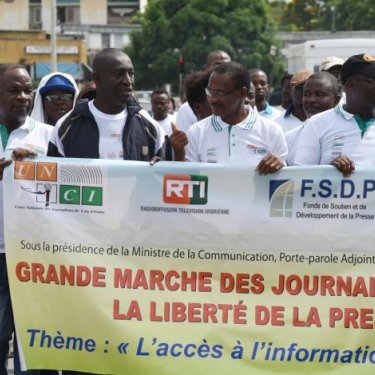RSF’s recommendations for protecting press freedom during Côte d’Ivoire’s elections

On the eve of a presidential election in Côte d’Ivoire on 31 October and amid many threats to journalists, Reporters Without Borders (RSF) is publishing its recommendations for making it easier and safer for journalists covering the elections in the field.
After more protests in recent days by the opposition, which insists that it is unconstitutional for President Alassane Ouattara to seek a third term, RSF is very concerned about the tension and threats to press coverage of the elections from both police and protesters.
Several foreign correspondents were the targets of threats on social media during an opposition rally in Abidjan on 11 October. Opposition party leaders went so far as to call for physical attacks again journalists.
Deutsche Welle’s Côte d'Ivoire correspondent, Julien Adayé, was roughed up by police in the north Abidjan suburb of Abobo in August while covering an opposition protest disputing the constitutionality of Ouattara’s candidacy. In July, Afriksoir news website editor André Sylver Konan and Abidjan.net reporter Félix Diby Boni were threatened and verbally attacked by politicians over their coverage of protests and political rallies.
To protect journalists’ physical safety and to ensure respect for press freedom, RSF recommends that:
Candidates
- Do not obstruct the work of journalists, cause them physical harm or damage their equipment;
- Facilitate journalists’ access to demonstrations and allow them to take photos and shoot video, in the knowledge that participation in a public event entails the possibility of being photographed or filmed.
The Ivorian authorities
- Ensure respect for press freedom and the freedom to inform before, during and after the elections;
- Endeavour to protect and secure journalists against all forms of violence, harassment, discrimination, unfair prosecutions and all other attempts to prevent them from carrying out their duties or undermine their ability to do so in accordance with international norms, including the International Covenant on Civil and Political rights;
- Put a stop to unjustified arrests and punishments of journalists;
- Refrain from public threats and smear campaigns against journalists and condemn any such threats or campaigns;
- Respect the state’s obligations under national and international law as regards press freedom and protecting journalists, media pluralism and media independence;
- Conduct impartial and independent investigations in order to identify and prosecute those responsible for crimes of violence against journalists;
- Order provincial governors to refrain from any threats or verbal violence against journalists and ensure that the security forces do not commit any further acts of physical violence against them:
- Put a stop to arbitrary closures of media outlets, abusive criminal proceedings against journalists and all other forms of harassment and pressure on journalists;
- Ensure that the Internet, including social media and other digital communication platforms, remains open, accessible and secured throughout the country before, during and after the elections;
- Ensure respect for all legal provisions guaranteeing access to information held by the state.
The media:
- Respect the principles of journalists’ rights and duties;
- Ensure that events are covered in an ethical manner and without inciting hatred, especially during news broadcasts;
- Act professionally during interviews and when moderating debates, and not give voice to those who spread hatred against religious and ethnic communities.
Côte d’Ivoire is ranked 68th out of 180 countries in RSF's 2020 World Press Freedom Index.



